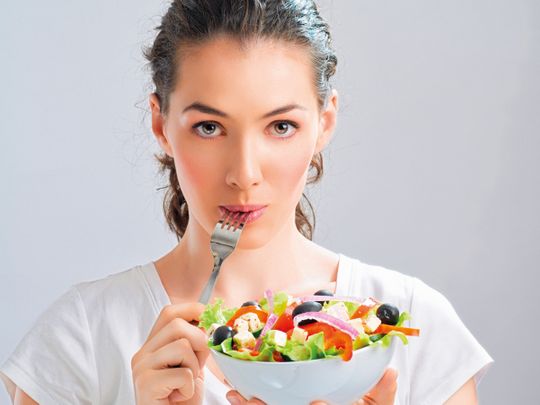
You are what you eat, goes the old adage. But what you eat has a direct impact on your health, and you can use food to address several health problems. UAE-based medical experts start you off with easy solutions for three common problems.
Insomnia
Can’t sleep at night? It’s probably something you ate, goes the traditional advice. But that’s not far wrong, says Dr Remy Shanker, a UAE-based doctor and nutritionist.
“Your diet plays a key role in your sleep cycle,” she says.

If your diet contains whole fresh foods, without processed ingredients, in rightly proportionate quantities leaving you satiated, it will help you wind down an hour before bedtime with no problems whatsoever.
Heavy meals, too much caffeine or alcohol, as well as a restrictive diet with a significant calorie deficit are all major reasons for poor sleep. Besides contributing directly in the form of indigestion, poor food choices can disrupt the body’s levels of hormones such as cortisol, often called nature’s alarm system, and the growth and sex hormones.
How to fix it “If your diet contains whole fresh foods, without processed ingredients, in rightly proportionate quantities leaving you satiated, it will help you wind down an hour before bedtime with no problems whatsoever,” Dr Remy says.
Look to diet choices such as high-quality protein in the form of wild organic salmon, raw nuts, seeds and whole, but lightly processed cheeses, she suggests.
These are sources of tryptophan, an amino acid that is a precursor to serotonin, which influences sleep, cognition and mood, and melatonin, a hormone involved in your body’s sleep-wake cycle.
Hair, skin and nails
Eating right is the best way to get glowing skin and healthy hair and nails. All are principally composed of the fibrous structural protein keratin, which also protects epithelial cells from damage or stress, so the right foods hit all three, says Zenia Menon, Nutritionist at Dubai Herbal Treatment Centre.
Additionally, a bunch of different nutrients help hair and nails to keep growing.
“Nutrients that contribute to hair and scalp health include niacin, biotin, zinc, iron, and vitamins A, B6, D, E and C, and their deficiencies can lead to thinning hair, brittle nails and skin problems,” she says.

Nutrients that contribute to hair and scalp health include niacin, biotin, zinc, iron, and vitamins A, B6, D, E and C, and their deficiencies can lead to thinning hair, brittle nails and skin problems.
Ridges on your nails may be a sign of inadequate magnesium, while brittle nails need more biotin, found in eggs. In addition, it’s worth remembering the impact of the four S’s when it comes to skin and hair health: sleep and sunshine, for their benefits, and smoking and stress for their harmful effects.
How to fix it Your body needs proteins to build keratin, so fill those supermarket trolleys with almonds, salmon, milk, eggs and lean red meat, while adding in blueberries and cacao (yes, chocolate — but only 70 per cent and above) for their antioxidant benefits, Brazil nuts for selenium, and leafy greens and soy beans for magnesium. It’s also worth getting a thyroid test: abnormal thyroid functioning can affect your hair and skin, Menon says.
Digestion
Heartburn, peptic ulcers, irritable bowel syndrome, constipation and diarrhoea are typically expressions of a digestive system that’s out of whack. One way to sort it out is by intermittent fasting, says Dubai-based keto coach Alexia Bjarkan. Researchers think that doing so gives the system a break from the work of digestion, and time to focus on autophagy, the cellular cleaning process that recycles damaged molecules, while simultaneously favourably influencing the balance of beneficial gut microbes.
Bjarkan recommends limiting your eating window to six hours a day, and fasting for the remaining 18. “That means, for example, to skip breakfast and eat lunch and dinner between 1 and 7 pm. Health benefits of intermittent fasting include weight loss and reduced risk for illness.”

One way to sort out the issues of the digestive system is by intermittent fasting. Limit your eating window to six hours a day, fasting for the remaining 18.
Although the research remains inconclusive, there is plenty of anecdotal evidence following books by the BBC’s Dr Michael Mosley
(The Fast Diet), and Canadian nephrologist Dr Jason Fung (The Obesity Code). At the same time, upping your fibre intake when you do eat is important, says Menon, because insoluble fibre bulks up your stool, while the soluble kind draws in water to prevent having loose stools.
How to fix it Fast, if you’d like to give it a go. And focus on
fibre-rich foods such as leafy greens, and whole grains, legumes and low-fructose fruits such as avocado, berries, oranges and grapefruits, Menon advises.
Eye on food
Junk food does a body no good. While fixing your diet likely won’t reverse eye damage, eating right can help prevent vision loss due to various eye diseases, as well as prevent problems with night vision, macular degeneration and dry eyes.
Foods rich in vitamins A, C and E are thought to maintain healthy cells and tissues in the eye. Think fruits and vegetables such as blueberries, oranges, tomatoes, carrots and green leafy vegetables, as well as nuts, seeds, dairy products and other food types. Research has also now come around to the benefits of the antioxidant, lutein and a similar substance, zeaxanthin. These yellow plant pigments are found in eggs, as well as peppers, sweetcorn and saffron, and green vegetables such as kale and broccoli. Both appear to improve macular health — the part of the eye that provides sharp, central vision needed for seeing objects clearly — have a beneficial impact on macular pigment levels, while reducing the risk of eye diseases such as AMD and cataracts.
— K.J.F.












